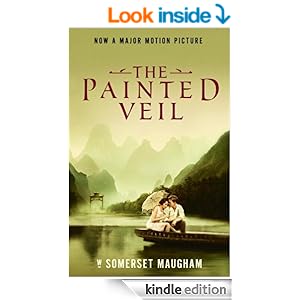Two books for this post: The Painted Veil, and Life After Life. Both about women with many layers, British women, both finding out that adultery isn’t all it’s cut out to be. One a classic, the other a modern bestseller. One to skip, and the other to lose yourself in for a weekend.
The Painted Veil
Plot summary: Walter loves Kitty. Kitty’s shallow (terribly shallow) and doesn’t love him but marries him anyway for some societal reason. They are sent to Hong Kong. He’s a bacteriologist. She’s a socialite. She has an affair with another British governmental representative. Walter finds out. Guess what, he’s mad. Guess what, the other guy’s not willing to give up his wife and government post for Kitty (whoops, guess what, in complete disregard for a covenant, everyone loses). So Walter punishes Kitty by taking her with him to work against a cholera epidemic. What does cholera have to teach them both?
My take on it: Somerset Maugham was a good writer, and that’s why this book is a classic. But unless you want to read a book where you’re endlessly disappointed in the main character, skip it. So I hear, watch the movie instead, but I haven’t seen it. I’m not one to deliberately watch what Hollywood tends to do with a plot like this one.
Life After Life
 I read this book later in the year, when I knew I was going to do the book club reviews, so I wrote down notes for it and have a lot more to say about it.
I read this book later in the year, when I knew I was going to do the book club reviews, so I wrote down notes for it and have a lot more to say about it.
Plot summary: (From Goodreads):
On a cold and snowy night in 1910, Ursula Todd is born, the third child of a wealthy English banker and his wife. Sadly, she dies before she can draw her first breath. On that same cold and snowy night, Ursula Todd is born, lets out a lusty wail, and embarks upon a life that will be, to say the least, unusual. For as she grows, she also dies, repeatedly, in any number of ways. Clearly history (and Kate Atkinson) have plans for her: In Ursula rests nothing less than the fate of civilization.
Wildly inventive, darkly comic, startlingly poignant — this is Kate Atkinson at her absolute best, playing with time and history, telling a story that is breathtaking for both its audacity and its endless satisfactions.
My take on it: “Playing with time and history” is right. It’s not often you come across a book plot that draws you in and is easy to read but at the same time is incredibly creative. Many times I find authors that try to be too creative very obtuse. You may find it confusing and the story doesn’t really ever have that big turning-point moment (“nothing less than the fate of civilization” is a stretch), but I enjoyed it. Read it on a cold weekend. I found myself willing Ursula to change the outcome this time, to finally figure out what was going to keep her from dying in the flu epidemic after World War I, to not walk down the road that would take her toward, say, Hitler. I loved the history in it; I felt so much more admiration for what the British did in standing alone against Germany for so long. And I loved Ursula’s strength, usually. And “needs must” is my new favorite British phrase.
Favorite takeaways:
“She doesn’t believe in dogs,” Bridget said.
“Dogs are hardly an article of faith,” Sylvie said.
Some amusing irony in light of the plot:
Life can be very short, you know.
I feel as if I’m waiting for something dreadful to happen, and then I realize it already has.
‘What if we had the chance to do it again and again,’ Teddy said, ‘until we finally did get it right? Wouldn’t that be wonderful?’
Sometimes it was harder to change the past than it was the future.
Some great stuff for language teachers:
“Do you speak French?”
“Well, we do it at school,” Ursula said. “But that doesn’t mean I can speak it.”“Are you really going to do Modern Languages? Your father says Latin might be more useful.”
“How can it be useful? Nobody speaks it,” Ursula said reasonably. This was an argument that had been rumbling genteelly all summer. She stretched her arms above her head. “I shall go and live in Paris for a year and speak nothing but French. That will be very useful there.”
“Oh, Paris,” Sylvie shrugged. “Paris is rather overrated.”
“Berlin, then.”
“Germany’s a mess.”
“Vienna.”
“Stuffy.”
“Brussels,” Ursula said. “No one can object to Brussels.”
It was true, Sylvie could think of nothing to say about Brussels.Recently graduated and failing to think of anything else, she had applied and been given a place on a teacher-training course… [looking for a job or something to do] anything really that would mean she didn’t end up as an embittered spinster in a girls’ grammar school, spooling her way through the conjugation of foreign verbs, chalk dust falling from her clothes like dandruff. (She based this portrait on her own schoolmistresses.) It wasn’t a profession that had garnered much enthusiasm in her immediate circle either.
“You want to be a teacher?” Sylvie said.“Perhaps I shall have to teach,” she said miserably.
“Fate worse than death,” Ursula agreed.
In a situation involving sexual assault, such a common reaction:
Before locking it away she had gone over the incident again and again, trying to see in what way she had been to blame. There must be something written on her skin, in her face, that some people could read and others couldn’t.
…a magnet for unsavory types– the man on the train, the man in the lane– and worried that they could read something in her that she couldn’t read herself…
More lines that caught my eye:
She was marrying a stranger, she realized. (“Everyone marries a stranger,” Hugh said.)
She always carried on her person a faint perfume of old vegetables and damp laundry. Ursula recognized it, it was the smell of poverty.
Life is too precious to be unhappy.
Like any good heroine, she had survived.
“We cannot turn away,” Miss Woolf told her, “we must get on with our job and we must bear witness.” What did that mean? Ursula wondered. “It means,” Miss Woolf said, “that we must remember these people when we are safely in the future.”
It was war itself that was evil, not men. Although she would make an exception for Hitler.
(I disagree. I think we all have the capacity to be Hitler inside us.)
Her religious faith [Miss Woolf] had begun to “crumble” since the start of the bombing. “Yet we must hold fast to what is good and true. But it all seems so random. One wonders about the divine plan and so on.”
“More of a shambles than a plan,” Ursula agreed.
(How sad, that we blame God for not fixing everything right away when the evil inside us makes everything seem like a “shambles.”)
“I thought you were a Buddhist.”
“Oh, I am nothing,” Dr. Kelley said. “And everything too, of course,” he added.…”Carpe diem and all that.”
“That seems to be everyone’s excuse for bad behavior,” Ursula grumbled. “If people believed in eternal damnation they might not be seizing the day quite so much.”There were some who would say the end started at the beginning, in the Garden.
(Actually, the end started long before that particular beginning.)
In one of my least favorite twists of the storyline, her affair with a married government representative (like Kitty!), she learns some of my favorite lessons in the story (guess what, when one completely disregards a covenant, everyone loses):
When her lover said he wouldn’t leave his family, she replied,
But I don’t want you to.
(Liar. A woman is incapable of ‘not wanting him to.’)
She would never be able to explain the forensics of adultery to Pamela… Pamela said, ‘I just like to believe that there are nuts and bolts that hold our society together-especially now-and that marriage is part of that.’
(Go, Pamela.)
She realized that she had accommodated Crighton’s needs a great deal more than he had hers, as if Moira and the girls somehow trumped her own existence.
(Sorry, Ursula, the wife and kids do trump your existence. That’s the forensics of adultery.)
They must stop their affair, Crighton said. The temptations of the flesh were apparently secondary to martial pursuits… But she had never been “in love” with him, she said. “And I expect we can still be friends.”
“I don’t think that we can, I’m afraid,” Crighton said.
(No, that’s rather a stupid expectation, actually.)
When Crighton signed a letter “yours,”-
But he was never hers, was he? On the contrary, he belonged to Moira. (Or perhaps the Admiralty.)
(Hmm, yes, that is how covenants work.)
‘I’m just the same person as I was before we did this,’ and he said, ‘I’m not sure I am.’
(No, neither one of you is.)
Some lines that made me reflect on losing my dad, and nod my head in agreement:
Hugh’s clothes were so very real it seemed absurd that the man who had worn them had disappeared.
It was so impossible to grasp that he had gone forever that they had all started trying to reconstitute him out of thin air.
‘My tears would never do justice to this loss.’
And a quote from the 60’s setting that made me really think:
They bandied the word “peace” around glibly as though it were an advertising slogan. They had not experienced a war (“And that’s a good thing,” she heard Sylvie say, “no matter how unsatisfactory they turn out”). They had been handed, in Churchill’s phrase, the title deeds of freedom. What they did with them was their affair now, she supposed.




